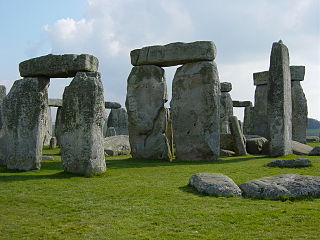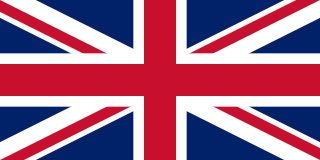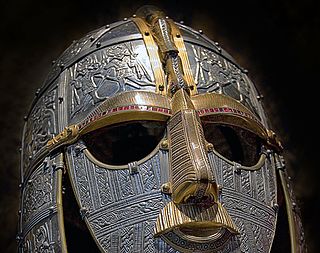
The British Isles are a group of islands in the North Atlantic Ocean off the north-western coast of continental Europe, consisting of the islands of Great Britain, Ireland, the Isle of Man, the Inner and Outer Hebrides, the Northern Isles, and over six thousand smaller islands. They have a total area of 315,159 km2 (121,684 sq mi) and a combined population of almost 72 million, and include two sovereign states, the Republic of Ireland, and the United Kingdom of Great Britain and Northern Ireland. The Channel Islands, off the north coast of France, are normally taken to be part of the British Isles, even though geographically they do not form part of the archipelago. Under the UK Interpretation Act 1978, the Channel Islands are clarified as forming part of the British Islands, not to be confused with the British Isles.

England is a country that is part of the United Kingdom. The country is located on the island of Great Britain, of which it covers roughly 62%, and over 100 smaller adjacent islands. It has land borders with Scotland to the north and Wales to the west, and is otherwise surrounded by the North Sea to the east, the English Channel to the south, the Celtic Sea to the south-west, and the Irish sea to the west. Continental Europe lies to the south-east, and Ireland to the west. The population was 56,490,048 at the 2021 census. London is both the largest city and the capital.

England became inhabited more than 800,000 years ago, as the discovery of stone tools and footprints at Happisburgh in Norfolk have indicated. The earliest evidence for early modern humans in Northwestern Europe, a jawbone discovered in Devon at Kents Cavern in 1927, was re-dated in 2011 to between 41,000 and 44,000 years old. Continuous human habitation in England dates to around 13,000 years ago, at the end of the Last Glacial Period. The region has numerous remains from the Mesolithic, Neolithic and Bronze Age, such as Stonehenge and Avebury. In the Iron Age, all of Britain south of the Firth of Forth was inhabited by the Celtic people known as the Britons, including some Belgic tribes in the south east. In AD 43 the Roman conquest of Britain began; the Romans maintained control of their province of Britannia until the early 5th century.

The monarchy of the United Kingdom, commonly referred to as the British monarchy, is the constitutional form of government by which a hereditary sovereign reigns as the head of state of the United Kingdom, the Crown Dependencies and the British Overseas Territories. The current monarch is King Charles III, who ascended the throne on 8 September 2022, upon the death of his mother, Queen Elizabeth II.

The Kingdom of England was a sovereign state on the island of Great Britain from the early 10th century, when it emerged from various Anglo-Saxon kingdoms, until May 1, 1707, when it united with Scotland to form the Kingdom of Great Britain, which would later become the United Kingdom. The Kingdom of England was among the most powerful states in Europe during the medieval and early modern colonial periods.
The Ulster Scots, also called Ulster Scots people or, in North America, Scotch-Irish (Scotch-Airisch) or Scots-Irish, are an ethnic group in Ireland, who share a common history, culture and ancestry, some of whom speak an Ulster Scots dialect of the Scots language, a West Germanic language. As an ethnicity, they descend largely from Scottish and English settlers who moved to the north of Ireland, during the 17th century.

The history of the British Isles began with its sporadic human habitation during the Palaeolithic from around 900,000 years ago. The British Isles has been continually occupied since the early Holocene, the current geological epoch, which started around 11,700 years ago. Mesolithic hunter-gatherers migrated from the Continent soon afterwards at a time when there was no sea barrier between Britain and Europe, but there was between Britain and Ireland. There were almost complete population replacements by migrations from the Continent at the start of the Neolithic around 4,100 BC and the Bronze Age around 2,500 BC. Later migrations contributed to the political and cultural fabric of the islands and the transition from tribal societies to feudal ones at different times in different regions.

British society is one of the most secularised in the world and in many surveys determining religious beliefs of the population agnosticism, nontheism, atheism, secular humanism, and non-affiliation are views shared by a majority of Britons. Historically, it was dominated for over 1,400 years by various forms of Christianity, which replaced preceding Romano-British religions, including Celtic and Anglo-Saxon paganism. Religious affiliations of United Kingdom citizens are recorded by regular surveys, the four major ones being the national decennial census, the Labour Force Survey, the British Social Attitudes survey and the European Social Survey.

The Welsh are an ethnic group native to Wales. Wales is one of the four countries of the United Kingdom. The majority of people living in Wales are British citizens.
The Cornish people or Cornish are an ethnic group native to, or associated with Cornwall and a recognised national minority in the United Kingdom, which can trace its roots to the Brittonic Celtic ancient Britons who inhabited Great Britain from somewhere between the 11th and 7th centuries BC and inhabited Britain at the time of the Roman conquest. Many in Cornwall today continue to assert a distinct identity separate from or in addition to English or British identities. Cornish identity has also been adopted by some migrants into Cornwall, as well as by emigrant and descendant communities from Cornwall, the latter sometimes referred to as the Cornish diaspora. Although not included as a tick-box option in the UK census, the numbers of those writing in a Cornish ethnic and national identity are officially recognised and recorded.
Martin Oswald Hugh Carver, FSA, Hon FSA Scot, is Emeritus Professor of Archaeology at the University of York, England, director of the Sutton Hoo Research Project and a leading exponent of new methods in excavation and survey. He specialises in the archaeology of early Medieval Europe. He has an international reputation for his excavations at Sutton Hoo, on behalf of the British Museum and the Society of Antiquaries and at the Pictish monastery at Portmahomack Tarbat, Easter Ross, Scotland. He has undertaken archaeological research in England, Scotland, France, Italy and Algeria.

Christianity is the largest religion in England, with the Church of England being the nation's established state church, whose supreme governor is the monarch. Other Christian traditions in England include Roman Catholicism, Methodism, Presbyterianism, Mormonism, and the Baptists. After Christianity, the religions with the most adherents are Islam, Hinduism, Sikhism, Judaism, Buddhism, modern paganism, and the Bahá'í Faith. There are also organisations promoting irreligion, including humanism and atheism. According to the 2021 census, Shamanism is the fastest growing religion in England.
The historical immigration to Great Britain concerns the movement of people, cultural and ethnic groups to the British Isles before Irish independence in 1922. Immigration after Irish independence is dealt with by the article Immigration to the United Kingdom since Irish independence.

Great Britain, often simply known as Britain, is an island in the North Atlantic Ocean off the north-west coast of continental Europe, consisting of England, Scotland and Wales. With an area of 209,331 km2 (80,823 sq mi), it is the largest of the British Isles, the largest European island and the ninth-largest island in the world. It is dominated by a maritime climate with narrow temperature differences between seasons. The island of Ireland, with an area 40 per cent that of Great Britain, is to the west—these islands, along with over 1,000 smaller surrounding islands and named substantial rocks, form the British Isles archipelago.
The English people are an ethnic group and nation native to England, who speak the English language, a West Germanic language, and share a common ancestry, history, and culture. The English identity began with the Anglo-Saxons, when they were known as the Angelcynn, meaning race or tribe of the Angles. Their ethnonym is derived from the Angles, one of the Germanic peoples who migrated to Britain around the 5th century AD.

British people or Britons, also known colloquially as Brits, are the citizens of the United Kingdom, the British Overseas Territories, and the Crown dependencies. British nationality law governs modern British citizenship and nationality, which can be acquired, for instance, by descent from British nationals. When used in a historical context, "British" or "Britons" can refer to the Ancient Britons, the Celtic-speaking inhabitants of Great Britain during the Iron Age, whose descendants formed the major part of the modern Welsh people, Cornish people, Bretons and considerable proportions of English people. It also refers to citizens of the former British Empire, who settled in the country prior to 1973, and hold neither UK citizenship nor nationality.

The settlement of Great Britain by diverse Germanic peoples, who eventually developed a common cultural identity as Anglo-Saxons, changed the language and culture of most of what became England from Romano-British to Germanic. This process principally occurred from the mid-fifth to early seventh centuries, following the end of Roman rule in Britain around the year 410. The settlement was followed by the establishment of the Heptarchy, Anglo-Saxon kingdoms in the south and east of Britain, later followed by the rest of modern England, and the south-east of modern Scotland. The exact nature of this change is a topic of on-going research. Questions remain about the scale, timing and nature of the settlements, and also about what happened to the previous residents of what is now England.

Anti-Catholicism in the United Kingdom dates back to Roman times. Attacks on the Church from a Protestant angle mostly began with the English and Irish Reformations which were launched by King Henry VIII and the Scottish Reformation which was led by John Knox. Within England, the Act of Supremacy 1534 declared the English crown to be "the only supreme head on earth of the Church in England" in place of the Pope. Any act of allegiance to the latter was considered treasonous because the papacy claimed both spiritual and political power over its followers. Ireland was brought under direct English control starting in 1536 during the Tudor conquest of Ireland. The Scottish Reformation in 1560 abolished Catholic ecclesiastical structures and rendered Catholic practice illegal in Scotland. Today, anti-Catholicism remains common in the United Kingdom, with particular relevance in Scotland and Northern Ireland.

The first evidence of human presence in Ireland dates to around 33,000 years ago, with further findings dating the presence of homo sapiens to around 10,500 to 7,000 BCE. The receding of the ice after the Younger Dryas cold phase of the Quaternary around 9700 BCE, heralds the beginning of Prehistoric Ireland, which includes the archaeological periods known as the Mesolithic, the Neolithic from about 4000 BCE and the Copper Age beginning around 2500 BCE with the arrival of the Beaker Culture. The Irish Bronze Age proper begins around 2000 BCE and ends with the arrival of the Iron Age of the Celtic Hallstatt culture, beginning about 600 BCE. The subsequent La Tène culture brought new styles and practices by 300 BCE.

Viking activity in the British Isles occurred during the Early Middle Ages, the 8th to the 11th centuries CE, when Scandinavians travelled to the British Isles to raid, conquer, settle and trade. They are generally referred to as Vikings, but some scholars debate whether the term Viking represented all Scandinavian settlers or just those who used violence.














